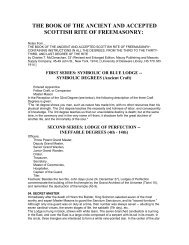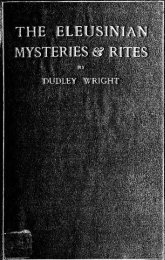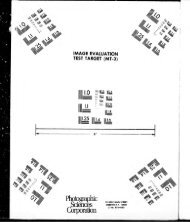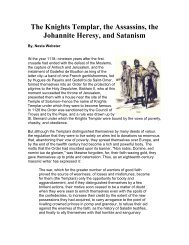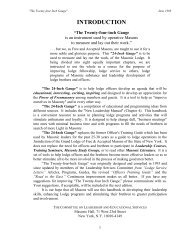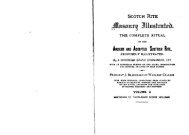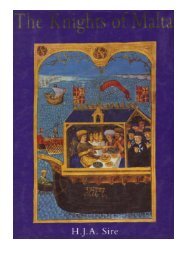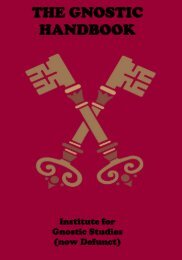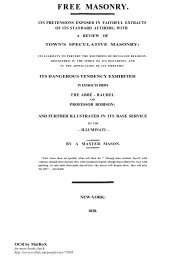The History of Initiation - The Masonic Trowel
The History of Initiation - The Masonic Trowel
The History of Initiation - The Masonic Trowel
Create successful ePaper yourself
Turn your PDF publications into a flip-book with our unique Google optimized e-Paper software.
104 HISTORY OF INITIATION.<br />
<strong>of</strong> a future state. <strong>The</strong> unity <strong>of</strong> the godhead was incul-<br />
49<br />
cated and ; during the process<br />
<strong>of</strong> celebration the following<br />
truth was repeatedly proclaimed: "Jupiter is King;<br />
he is the primitive source <strong>of</strong> all things there is ONE ; God ;<br />
ONE power, and ONE Ruler over all!" 50 <strong>The</strong>se disquisitions<br />
were mixed up with the rhapsodies <strong>of</strong> Homer, 51 the<br />
doctrines <strong>of</strong> purgatory, transmigration, and a series <strong>of</strong><br />
mythological allegories that darkly shadowed out the<br />
52<br />
events <strong>of</strong> the Deluge, accompanied with diffuse and mys-<br />
Sanchoniatho also, were admitted to be acquainted with the Greatest<br />
Mysteries, in the religious initiations <strong>of</strong> the heathens ; and that they<br />
have truly told us that this worship <strong>of</strong> such great men as were the<br />
founders <strong>of</strong> arts and civil government, was the grand secret <strong>of</strong> it ; which<br />
was not communicated even to those that were initiated into the<br />
Lesser Mysteries." (Cumb. Sanch., p. 348.)<br />
49 Euseb. prasp. evan., 1. xiii. Cudw. Intell. Syst., c. iv., s. 18.<br />
50 Proclus (in Tim., p. 95.) mentions a gem <strong>of</strong> Serapis,<br />
which bears<br />
an inscription to the same purport, Ets Zevs Zaqams, ONE Jupiter<br />
Serapis. Many testimonies to this effect may be seen in Grotius. de<br />
Veritate, 1. s. 10.<br />
i.,<br />
51 "<br />
It is enacted that at the celebration <strong>of</strong> the Panathenaea majora,<br />
Homer's rhapsodies be repeated." (Lycurg. in Leocr. Elian.)<br />
53 To enumerate these legends would require a volume. <strong>The</strong> fable<br />
<strong>of</strong> the Titans making war on Jupiter was an instance <strong>of</strong> the allegorizing<br />
spirit <strong>of</strong> idolatry, for the rebellious Titans were no other than the<br />
whole antediluvian race <strong>of</strong> mankind, except eight persons, who were<br />
hence sometimes distinguished by the appellation <strong>of</strong> the just Titans;<br />
Hesiod terms them gods. (<strong>The</strong>og., v. 838.) <strong>The</strong> former by their impiety<br />
set at defiance the divine power and justice, and were lost in<br />
the Flood. To the same effect was the tradition <strong>of</strong> the contest between<br />
Jupiter and the giants, in which the latter were destroyed. (Apollod.<br />
Bibl., 1. i., c. 6.) <strong>The</strong> overthrow <strong>of</strong> Typhon was but a representation<br />
<strong>of</strong> the return <strong>of</strong> the diluvian waters into their subterranean recesses.<br />
(Ovid. Metam., 1. v.) <strong>The</strong> wanderings <strong>of</strong> lo, Isis, Rhea, Ceres, &c., as<br />
we have already seen, were but figurative allegories <strong>of</strong> the erratic<br />
and desultory voyage <strong>of</strong> the ark and the same event is referred ;<br />
to in<br />
the fable <strong>of</strong> the wanderings <strong>of</strong> Lysippa, Iphinoe, and Iphianassa. the<br />
three daughters <strong>of</strong> Pretus or Minyas, who were struck with madness<br />
for having despised the Bacchic mysteries. <strong>The</strong> murder <strong>of</strong> one <strong>of</strong> the<br />
Cabiri by one <strong>of</strong> his brothers, like the death <strong>of</strong> Osiris and Bacchus,<br />
related to the symbolical death <strong>of</strong> Noah. <strong>The</strong> expedition <strong>of</strong> the<br />
Argonauts might have a reference to the Deluge, as Mr. Bryant and<br />
the story <strong>of</strong> the birth <strong>of</strong> Bacchus<br />
Mr. Faber are decidedly <strong>of</strong> opinion ;<br />
amidst the thunder and lightning which destroyed his mother Semele ;<br />
(Ovid. Metam., 1. Hi.) and his being enclosed in the thigh <strong>of</strong> Jupiter,<br />
was only the fable <strong>of</strong> the Deluge, and the preservation <strong>of</strong> Noah in the<br />
ark, for Arcch, an ark. and Yarech, a thigh, might easily, by the fanci-<br />
ful genius <strong>of</strong> polytheism, be substituted the one for the other. (Vid.<br />
Diod. Bibl., p. 123.) <strong>The</strong> descent <strong>of</strong> Hercules to hell, and the restoration<br />
<strong>of</strong> Hyppolitus to life, were derived from the regeneration <strong>of</strong>



